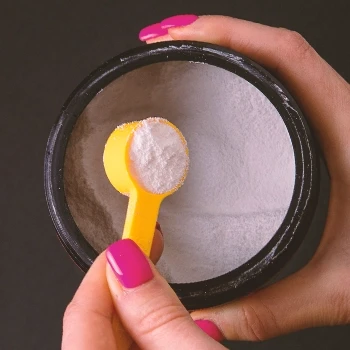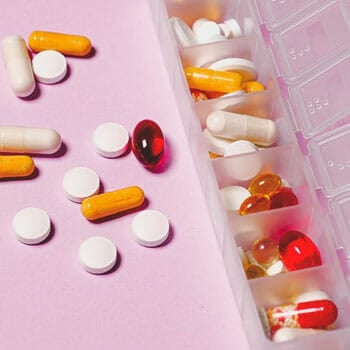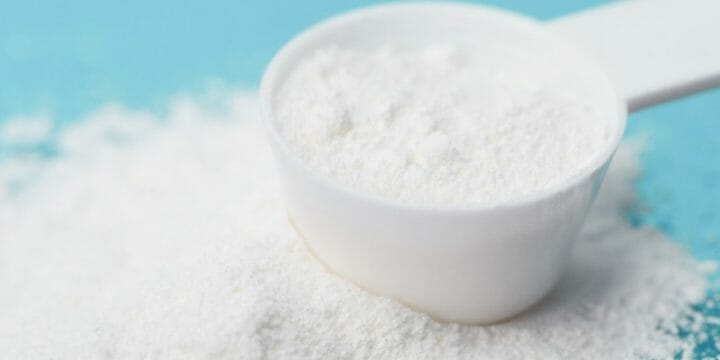As a fitness trainer, I've witnessed the increasing popularity of pre-workouts.
It's no wonder people love using them. They help you reach your fitness goals and give you the much-needed energy to power through strenuous workouts.
But as great as they are, these supplements can still cause some side effects.
And one of which is: will taking pre-workouts keep me awake?
Let’s find out.
Quick Summary
- Pre-workouts will keep you awake because they are packed with caffeine that boosts your energy levels, and enhance your performance while working out.
- Caffeine, a primary ingredient in many pre-workouts, can take up to five hours to wear off, with its effects lasting between three and five hours, potentially disrupting sleep.
- A study by the National Institutes of Health (NIH) found that participants who consumed 400 mg of caffeine close to bedtime experienced disrupted sleep or insomnia.
- From my perspective, pre-workouts can indeed give a noticeable boost to exercise sessions. However, having personally heard and read about potential side effects, I feel it's vital to balance their intake, especially if considering taking them later in the day.
Will Pre-Workouts Keep Me Awake?

Yes, there’s a chance the pre-workouts you’re taking might cause insomnia.
Based on our firsthand experience, pre-workouts, especially those packed with caffeine, will indeed keep you awake, enhancing your energy levels and workout performance.
If you're looking for other pre-workout recommendations, I recommend you check out:
Everyone knows that caffeine keeps you awake, but did you know that it also activates epinephrine and norepinephrine [1]?
You might know these hormones by their other name — fight or flight hormones. They keep you wired as they course through your system.
The half-life of caffeine is how long its effects last, usually between three and five hours.
It's common knowledge that almost everyone will have trouble falling asleep and sleeping if they take a caffeine-packed pre-workout supplement before a late-night workout.
Why You Can't Sleep After Taking Pre-Workouts

If you have trouble sleeping after taking a pre-workout supplement, the blend is most likely packed with stimulants.
About 20 minutes after taking a stim-packed supplement, the blend hijacks your nervous system to help you power through the exercise program and get the results you're aiming for.
Most pre-workout supplements will give your exercise session an energy boost, but they tend to cause insomnia. That is why it is recommended to take pre-workout supplements when feeling tired.
On top of this, taking a pre-workout supplement is known to raise heart rates and metabolic activities, which makes it hard to get enough restful sleep.
6 Main Ingredients in Pre-Workouts
Caffeine is one of the most common ingredients in pre-workout supplements, but a pre-workout is only as good as the ingredients it contains.
You should always go for high-quality pre-workout supplements that’ll give you the best effects.
They should be packed with top-notch nutrient-rich ingredients, such as:
1. Caffeine

Through our practical knowledge, we've identified caffeine as a prevalent ingredient in pre-workouts, but the efficacy of a pre-workout truly depends on its overall ingredient composition.
Numerous research studies have proven that caffeine is excellent for boosting your athletic performance; one of the research studies was conducted by the National Institutes of Health (NIH) and talked about how caffeine increases muscle performance during training sessions [2].
The most important conclusions researchers have come to are that:
- Taking an average of 150–200 mg of caffeine will improve the one-rep maximum in a group of weightlifters during bench press lifts and squats.
- Taking 5 mg of caffeine for every 2.2 lbs of body weight will allow athletes to train harder and longer (or until fatigue).
This is a high amount of caffeine, for sure, but researchers have gotten similar results in studies using lower doses, too, like in this research conducted by the National Institutes of Health (NIH) [3].
But why is caffeine so effective? During its half-life, caffeine affects your body in several ways:
- It stimulates the central nervous system
- Causes the body to release adrenaline, and
- Banishes fatigue temporarily
Moreover, it also increases your metabolism and helps you burn more calories during your workout. Caffeine also increases fat oxidation, which enables you to burn off more fat during a workout.
2. L-Theanine

Too much caffeine can leave you feeling irritable and wired, and l-theanine will help you combat these side effects.
The substance can be typically found in tea leaves, but some species of mushrooms also contain it.
L-theanine is an amino acid known for promoting the feelings of calmness and relaxation [4] and stimulating the release of relaxation chemical GABA.
The main aim of L-theanine is to channel the energy of caffeine where you need it most.
Research reveals that L-theanine improves sleep quality, sports performance while promoting a more positive mood and feelings of overall well-being.
According to Annals of Palliative Medicine (APM) research findings, L-theanine may assist in improving your sleep quality, allowing you to achieve a revitalizing slumber [5].
3. Creatine

Our finding indicates that when scouting for top-tier pre-workout supplements, creatine often stands out as a primary ingredient.
Nothing beats this supplement for developing bar-crushing strength and power, and building lean muscle mass.
Creatine provides you with these incredible benefits by boosting ATP synthesis, which are the molecules your body needs to make energy.
The more creatine a pre-workout has, the more high-power energy it'll give you.
Taking creatine before your workout will help you:
- Reduce hydrogen, lactic, and pyruvic acid build-up
- Get more maximal energy
- Banish fatigue
- Build muscle mass, power, and strength
- Reduce myostatin levels, which is the compound that inhibits muscle growth [6]
4. Citrulline Malate

Citrulline malate is the ingredient responsible pumping up your muscles and helping you look swell.
It's an amino acid that triggers nitric oxide production.
High nitric oxide levels in your blood flow will provide your body with more oxygen, which results in your muscles getting more nutrients.
Pre-workout supplements rich in citrulline malate will supercharge not only your endurance and power production, but they'll also increase protein synthesis, which will give you a more jacked muscle mass.
Enhanced circulation ensures that oxygen and vital nutrients are efficiently delivered to the working muscles, optimizing their functionality and reducing fatigue.
By promoting optimal blood flow, citrulline malate assists athletes in achieving peak performance levels and maintaining their competitive edge during intense training sessions and competitions.
5. Maca Root

Maca is a herbal supplement from Peru, known for its numerous health benefits.
But did you know that it also promotes aerobic performance and boosts your brainpower?
Go for a pre-workout supplement that contains maca to get the most out of your exercise.
6. Synephrine

Synephrine is a molecule very similar to ephedrine and DMAA.
This common stim pre-workout ingredient is the active ingredient in Bitter Orange.
Scientists have discovered that it could enhance fat burning and boost your metabolism.
Moreover, it works incredibly well with caffeine.
However, as great it might be, this ingredient stimulates the heart, which could possibly be unsafe when used for weight loss.
So, the best thing would be to consult your physician before using a pre-workout that contains synephrine, just to be sure.
How To Avoid Insomnia When Taking Pre-Workouts?

Take Sleep Supplements
To avoid insomnia when taking pre-workouts, take sleep supplements.
Sleep supplements do not just help you fall asleep faster but they also improve the quality of your sleep.
You will wake up feeling refreshed in the morning by providing the deep rest and recovery that your body needs.
Avoid Supplements That Are High in Caffeine
Our findings show that if you wish to maintain a regular sleep cycle, it's advisable to steer clear of pre-workouts loaded with caffeine.
Yes, I said that caffeine isn’t the only culprit for your pre-workout-caused insomnia, but it’s the main one.
The substance takes some 20–30 minutes to peak in your bloodstream, but it can take anywhere from four to six hours for you to get it out of your system.
Time Your Workouts Right
Drawing from our experience, it's optimal to consume your pre-workout about 30 minutes prior to hitting the gym. If it disrupts your sleep, consider adjusting your workout timing to better utilize the energy boost.
Let’s say you take a pre-workout at 8 pm and hit the gym. It’ll still be in your systems hours later — until about 2 am.
"Keep in mind that having too much caffeine can have serious side effects. You can experience things like a racing heart, tingling, high blood pressure, GI issues and even nausea."
- Kate Patton, MEd, RD, CCSD, LD
Of course, you don't have to use a caffeine-packed supplement. You could try a stim-free pre-workout or change the timing if you decide to keep the stim-packed supplement in your routine.
Should You Use Stim or Stim-Free Pre-Workouts?

The decision depends entirely on you. Stim pre-workouts will give you better results and more “bang,” but they may also cause insomnia.
You don’t have to give up on caffeine-based pre-workout. Yes, stim-free supplements are good, but they’re not as good as the regular pre-workout.
The main thing with high-quality caffeine-free pre-workout supplements is that they provide you with that burst of energy caffeine typically gives.
But, they don’t have that “bang” most athletes are looking for.
So, if you decide to stick to the regular supplement with stimulants, don't take them late at night but a couple of hours before sleep.
National Institutes of Health (NIH) conducted a study where they gave the participants 400 mg of caffeine before bedtime, three and six hours beforehand. As you can guess, the group that took caffeine closer to bedtime had insomnia or disrupted sleep [7].
3 Common Ingredients in Stim-Free Pre-Workouts

If you decide that risking insomnia for swell muscles isn’t worth it and that you’d rather take supplements free from stimulants and have a good night of sleep, you should know the most common ingredients used for these supplements:
1. Creatine
No, this isn't a mistake. Creatine is common in stim and stim-free pre-workouts. The reason for this is simple — because it's so helpful.
As I mentioned, creatine boosts power, strength and enhances muscle growth, but it also fights fatigue and increases your energy.
2. BCAAs
Branched-chain amino acids, or BCAAs, are added to non-stim pre-workouts for the wrong reason — increasing the muscle protein synthesis.
Now, BCAAs are excellent for this purpose, but only if your dietary protein is low. However, what people aren’t aware of is that BCAAs are fantastic for reducing fatigue without the added stimulation. They can help you push through those extra couple of reps while working out tired.
3. Beta-Alanine
Beta-alanine is a non-stimulant that can help you fight fatigue, increase your power, and increase your muscular endurance. Moreover, it could also help you a little bit with fat loss.
If you're looking for other pre-workout recommendations, I recommend you check out:
References:
- https://pubmed.ncbi.nlm.nih.gov/1356551/
- https://www.ncbi.nlm.nih.gov/pmc/articles/PMC7706635/
- https://www.ncbi.nlm.nih.gov/pmc/articles/PMC4213371/
- https://www.medicalnewstoday.com/articles/324120#benefits
- https://apm.amegroups.org/article/view/68521/html
- https://www.healthline.com/nutrition/10-benefits-of-creatine#:~:text=Additionally%2C%20some%20research%20indicates%20that,increased%20muscle%20growth%20and%20size.
- https://www.ncbi.nlm.nih.gov/pmc/articles/PMC3805807/#:~:text=The%20results%20of%20this%20study,detrimental%20effects%20on%20daytime%20function.
About The Author
You May Also Like






